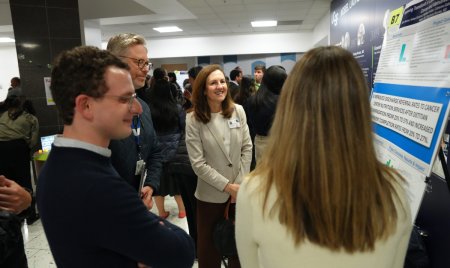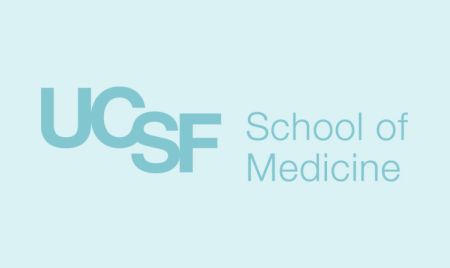UCSF Pediatrics Diversity Committee Hosts Virtual Outreach Program for High School Students

Between 50 and 100 FACES Health Scholars attended each of the four virtual sessions hosted by the Pediatrics Diversity Committee.
UCSF pediatrics residents and faculty extended their reach past the clinic and into the realm of online education for high school students this Spring.
The community outreach branch of the Pediatrics Diversity Committee, led by UCSF resident physicians, Drs. Daniela Brissett, Gwen Hubner, Greta Peng, Jessica Williams, and Tiana Woolridge, collaborated with FACES for the Future, a program that provides support to high school students from underrepresented backgrounds through education and exposure to health careers, to create a series of educational webinars this April and May. Fifty to 100 FACES Health Scholars attended each of the four virtual sessions.
The collaboration with UCSF and FACES for the Future originally intended to bring 10 students to the UCSF Benioff Children’s Hospital at Mission Bay for an in-person interdisciplinary internship. In response to the shelter-in-place order due to the COVID-19 pandemic, however, the committee created an online curriculum, including a healthcare career panel, a webinar on pediatric case studies, a COVID-19 Q&A panel, and a wellness session with a focus on self-compassion and self-affirmation. They were able to recruit help to host the virtual programming from many enthusiastic Mission Bay faculty and healthcare providers.
UCSF Benioff Children’s Hospital at Mission Bay has never hosted any pipeline programs before; most occur at San Francisco General Hospital, according to Dr. Alma Martinez, Professor of Pediatrics and Director of Diversity for the department. The committee wanted to open up its doors, especially to high school students who may not see themselves there because of their background.
“The idea was to show the students that they are welcome in this environment and see familiar faces,” said Dr. Peng, pediatric neurology resident and community outreach co-chair of the diversity committee.
Webinar volunteers included attending physicians, residents, medical students, nurses, nurse practitioners, occupational therapists, physical therapists, and social workers.
With her interest in adolescent medicine, Dr. Brissett, pediatrics resident and community outreach co-chair, said she believes that in order to deliver high quality care, providers have to listen to and learn from their community, which is why community outreach programs like this are so important.
“For decades many of the community members that the hospital serves have not had a seat at the table,” Dr. Brissett said. “If we have a commitment to deliver the best healthcare, we need to provide the best providers, and one of the ways we do that is by strengthening our pipelines.”
As a long-time community partner with schools in California, New Mexico, and Colorado, FACES for the Future aims to support the development of young people interested in pursuing health careers.
“Having UCSF on board and bringing their positive energy and vision to the table has been very inspiring,” said Veronica Sanchez, FACES for the Future Program Associate. “The students’ reflections were enlightening and positive, and they were grateful to connect with people who inspired them, especially during a time when everyone was experiencing major changes in life.”
For Dr. Hubner, pediatrics resident and community outreach co-chair, the experience reaffirmed why she chose to pursue pediatrics. She said the field provides a unique opportunity to work in preventative ways to address the health disparities in the community.
“As you look up the hierarchy of medicine and medical training, you see fewer people of color,” Dr. Hubner said. “Creating these pipeline programs that introduce underrepresented minority students to health and healthcare at a young age is really important to address these issues in medicine.”
Many FACES for the Future Health Scholars said that the personal stories shared by UCSF providers during the webinars positively influenced how they think about their futures in healthcare, especially during this time of social unrest.
“There are many times when I’m the only black woman in the room. I really want to see these doors open for children of color because I know how much growth can happen within one generation,” said Tiana Woolridge, pediatrics resident and member of the diversity committee. “I really want to see us come out of this time of racial tension differently than the way we came in, in terms of how we think about equity, opportunities, and access.”
Dr. Tomas Magana, pediatrician and Founding Director for the FACES for the Future Institute based in Oakland, said the virtual interaction was very impactful and hit the themes of the FACES program, which are about holistic support of young people as they go through the educational pipeline.
“This pilot effort represents a really important example of academic community partnership,” Dr. Magana said. “UCSF is known for its research, clinical medicine, and academics, but equally important is a responsibility to connect authentically with community and community-based organizations.”
Based on the success of these webinars, UCSF Pediatrics and FACES for the Future are planning to create future programming that is sustainable for the Health Scholars.
The next outreach effort, which will incorporate a larger breadth of healthcare professionals, is planned for September.









